#salesforce service cloud analytics
Explore tagged Tumblr posts
Text
Increase Customer Satisfaction Rate With Salesforce Service Cloud
Salesforce Service Cloud is a multichannel support platform with features like Service Console, Telephony Integration, Case Management, Social Customer Service, etc., to address customer service requests quickly and smartly. Get personalized support from Salesforce Service Cloud implementation partners today.
#salesforce service cloud implementation partners#salesforce service cloud Implementation#salesforce service cloud analytics#salesforce certified service cloud consultant#einstein analytics service cloud#salesforce service cloud consultant#salesforce cloud service provider#service cloud support#salesforce service cloud integration#salesforce service cloud features#salesforce service cloud services
1 note
·
View note
Text
#salesforce#salesforce cloud#CRM#CRM platform#customer service#Features of Salesforce#manage customer interactions#Service Cloud#Marketing Cloud#Commerce Cloud#Einstein AI#Analytics Cloud#Community Cloud#Mobile App#Operational Efficiency#Scalability#Security
0 notes
Text
Using Salesforce AI and CRM Analytics to Enhance Financial Planning
Introduction: In an industry where trust and personalized service are paramount, financial planning professionals seek tools that enhance client relationships and streamline operations. Salesforce Financial Service Cloud, combined with CRM Analytics and Salesforce AI, is setting a new standard for CRM solutions in the financial sector. This platform enables advisors to deliver precise, data-driven financial plans that align with clients' goals and preferences.
Enhancing Financial Planning with CRM Analytics: With Salesforce Financial Service Cloud, financial planners gain a 360-degree view of their client's financial status, goals, and preferences. CRM Analytics enables planners to assess this data in real-time, identifying trends and patterns that inform better financial planning decisions. For instance, it can highlight investment preferences and potential risk areas, allowing planners to tailor recommendations to the client's specific needs.
Leveraging Salesforce AI for Predictive Insights: Salesforce AI enhances financial planning by providing predictive insights that aid in future planning. For example, it can predict changes in client needs based on historical data, enabling advisors to proactively address these changes. Furthermore, Salesforce AI's automation capabilities allow financial planners to manage more clients effectively by automating routine follow-ups, freeing up time to focus on strategic planning.
Conclusion: By integrating CRM Analytics and Salesforce AI with Salesforce Financial Service Cloud, financial planners can offer clients highly personalized, data-informed financial guidance. This approach builds trust and enhances the advisor-client relationship, setting financial planners apart in a competitive landscape. As these technologies continue to advance, they promise even greater potential for revolutionizing the way financial planning is conducted.
0 notes
Text
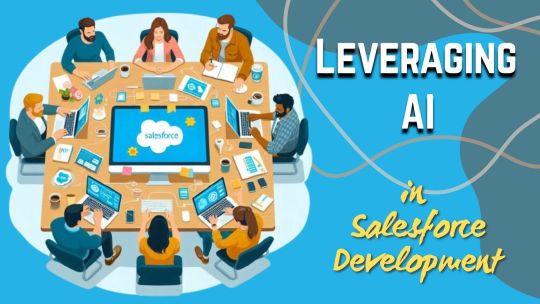
Leveraging AI in Salesforce Development
Artificial Intelligence (AI) is revolutionizing Salesforce development by infusing intelligence into traditional CRM processes. AI allows Salesforce to evolve from a static data management platform into a dynamic, insight-driven system that can predict, recommend, and automate key functions. With AI, Salesforce development is now more about building solutions that are not just reactive but proactive.
Know more at: https://www.cyberswift.com/blog/leveraging-ai-in-salesforce-development/
#generative ai in salesforce#salesforce ai cloud#salesforce einstein gpt#ai-powered crm solutions#bill cipher#salesforce automation with ai#predictive analytics in salesforce#ai-driven customer insights#ai-enhanced salesforce workflows#salesforce lightning and ai integration#chatbots and salesforce crm#salesforce consulting services#salesforce crm solutions#custom salesforce development#salesforce lightning development#salesforce app development#salesforce api integration#salesforce cloud services#salesforce automation solutions#salesforce migration services#salesforce support and maintenance#low-code salesforce development#ai-powered salesforce solutions#iot integration with salesforce#salesforce blockchain integration
1 note
·
View note
Text
Barcode Scanners Apps – Enterlogix Corporation
Enterlogix Corporation offers Barcode Scanners Apps designed to streamline your business operations. Our powerful mobile solutions empower your team to efficiently track inventory, manage assets, and improve overall productivity. With user-friendly interfaces and robust functionality, our barcode scanner apps are compatible with a wide range of devices, ensuring seamless integration into your existing systems. Whether you're in retail, logistics, or any industry that relies on barcode data, Enterlogix Corporation's apps provide real-time accuracy and data visibility.
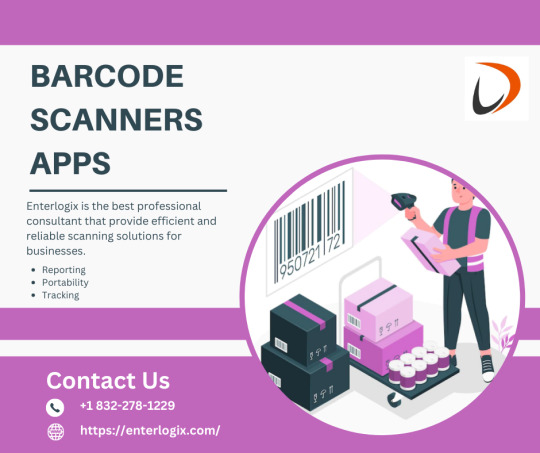
#business intelligence services#business intelligence analytics#cloud strategy consulting#power platform microsoft#salesforce consulting services
0 notes
Text
5 Trends in ICT
Exploring the 5 ICT Trends Shaping the Future The Information and Communication Technology (ICT) landscape is evolving at a rapid pace, driven by advancements that are transforming how we live, work, and interact. Here are five key trends in ICT that are making a significant impact:
1. Convergence of Technologies
Technologies are merging into integrated systems, like smart devices that combine communication, media, and internet functions into one seamless tool. This trend enhances user experience and drives innovation across various sectors
Convergence technologies merge different systems, like smartphones combining communication and computing, smart homes using IoT, telemedicine linking healthcare with telecom, AR headsets overlaying digital on reality, and electric vehicles integrating AI and renewable energy.
2. Social Media
Social media platforms are central to modern communication and marketing, offering real-time interaction and advanced engagement tools. New features and analytics are making these platforms more powerful for personal and business use.
Social media examples linked to ICT trends include Facebook with cloud computing, TikTok using AI for personalized content, Instagram focusing on mobile technology, LinkedIn applying big data analytics, and YouTube leading in video streaming.
3. Mobile Technologies
Mobile technology is advancing with faster 5G networks and more sophisticated devices, transforming how we use smartphones and tablets. These improvements enable new applications and services, enhancing connectivity and user experiences.
Mobile technologies tied to ICT trends include 5G for high-speed connectivity, mobile payment apps in fintech, wearables linked to IoT, AR apps like Pokémon GO, and mobile cloud storage services like Google Drive.
4. Assistive Media
Assistive media technologies improve accessibility for people with disabilities, including tools like screen readers and voice recognition software. These innovations ensure that digital environments are navigable for everyone, promoting inclusivity.
Assistive media examples linked to ICT trends include screen readers for accessibility, AI-driven voice assistants, speech-to-text software using NLP, eye-tracking devices for HCI, and closed captioning on video platforms for digital media accessibility.
5. Cloud Computing
Cloud computing allows for scalable and flexible data storage and application hosting on remote servers. This trend supports software-as-a-service (SaaS) models and drives advancements in data analytics, cybersecurity, and collaborative tools.
Cloud computing examples related to ICT trends include AWS for IaaS, Google Drive for cloud storage, Microsoft Azure for PaaS, Salesforce for SaaS, and Dropbox for file synchronization.

Submitted by: Van Dexter G. Tirado
3 notes
·
View notes
Text
THE 6 FREE MARKETING TOOLS EVERY MARKETER NEEDS TO USE
Are you aware of the top marketing tools out there that not only help you get your job done better, but are completely FREE? There are a number of excellent free marketing tools, and we’ve compiled some of the top in the categories that help you master your marketing. Whether you add all or a few to your marketing toolbox, you’ll reap the benefits of these resources right away and work smarter, not harder.
Project Management: Trello
Lead Generation: Hubspot
Design: Canva
Content: Answer the Public
SEO: Google Free Business Profile and Google Analytics
Social Media Management: Buffer
PROJECT MANAGEMENT: TRELLO
This highly visual organization tool is a master at project management. It lays everything out intuitively on “boards” reminiscent of an old-school desk blotter and designed to manage projects, workflows, and tasks, from the big picture down to the finest detail. With the free version of Trello, you can create unlimited boards that contain a project or process, lists encompassing all tasks and divided into “To Do,” “Doing,” and “Done” (or your own custom process), and smaller, movable “cards” with the information you need to accomplish these tasks, tied to deadlines and assigned doers.
Trello helps you boost your productivity. It keeps everyone moving, with spaces to comment on the cards, and add files and checklists. It also integrates with Slack, Dropbox, Outlook, Gmail, Salesforce, and more, with “power-ups,” or plug-ins, that expand your capabilities. The free version gets you unlimited cards, built-in automation, due dates, mobile and desktop apps, unlimited activity logs, templates, and unlimited power-ups. Then if you find you’re needing more, it’s a reasonable jump in monthly rate for more robust options.
LEAD GENERATION: HUBSPOT
Hubspot is known for many things to many marketers. It’s a robust CRM platform with highly effective marketing, sales, and service tools. The software is king at lead generation. It helps marketers attract potential visitors and leads through inbound marketing, ushering them through the buyer’s journey, and converting them into customers.
While HubSpot’s capabilities are wide-ranging and complex, you can take advantage of its CRM tools in a free suite that includes email marketing, live chat, forms, pop-ups, ads, landing pages, reports, and more. This version has some very helpful features; marketers can add more information about incoming leads with data gleaned from the internet, populating charts with social profiles, job titles, where they came from online, and what they viewed before they filled out their form. You’ll be able to track these potential customers when they return to your site as well, and since each action is mapped, you can track timing too. The free version of HubSpot also provides analytics so you know which of your pages, offers, and traffic sources are pulling the highest conversions. You’ll see the number of visits before customers buy and identify other trends in site navigation so you can optimize your site.
Hubspot also offers paid subscriptions, but these free capabilities are highly effective, so you can always add on later if you’d like:
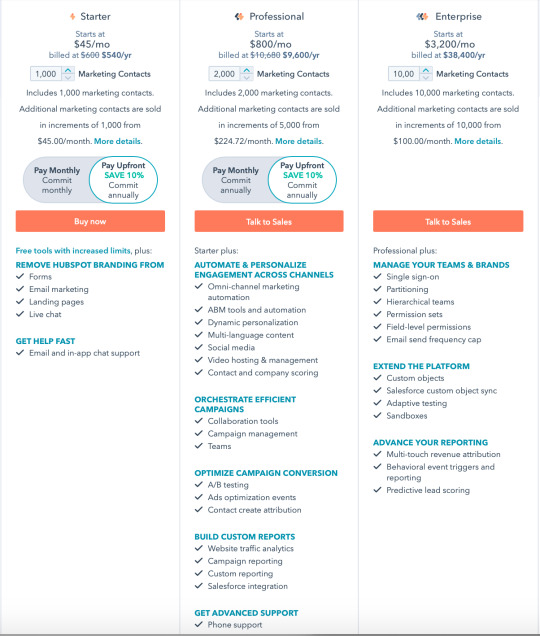
DESIGN: CANVA
In the way that self-publishing content through social media has revolutionized the media industry, Canva has similarly given people a free platform with which to create beautiful brochures, business cards, banners, infographics, cards, logos, designs for promotional items, social media images, posters, newsletters, videos and so much more. Started in 2013, the platform offers many tools for free, including 250,000+ templates, 100+ design types (social media posts, presentations, letters, and more), free photos and graphics, additional team members, and 5GB of cloud storage, plus access to easy tutorials and other great resources, including a robust blog for marketing, design, and branding. You can level up to Pro and Enterprise for more features, which are free for classrooms and nonprofits.
Canva offers excellent tools for laying out and designing professional-looking pieces even if you’re not a professional designer. With this design tool, you can create postcards for your upcoming sale, Instagram images for branding, or a flyer with your services. Its intuitive interface has made good design more accessible for all of us.
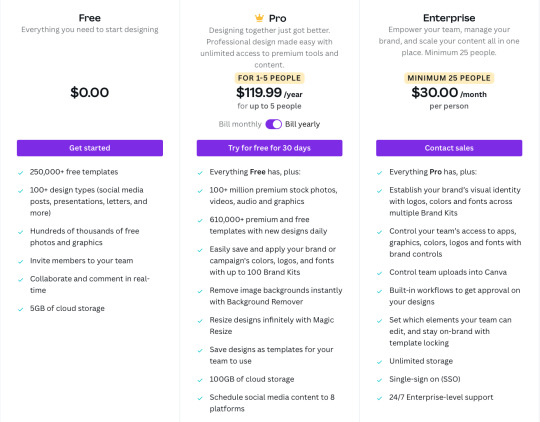
CONTENT: ANSWER THE PUBLIC
This content-generating tool is so simple that you’ll want to play with it for hours. It makes a great party game too, especially since it’s powered by a perky robot. The premise is simple: just enter the topic you’re interested in covering for your content strategy, and it will (within seconds), deliver an elegantly charted image containing more search terms than you can possibly use. The way it works is by collecting the autocomplete data from the 3 billion+ daily Google searches and mapping them out into “what,” “how,” “where,” and more.
You get an unfiltered look into the minds of searchers, to learn the information that they’re really seeking—and sometimes it’s surprising. You can leverage this content to create the next headlines and search terms for your blogs and social media posts. If your audience feels like you’re reading their minds, it’s because you pretty much are.
With Answer the Public’s free version, you can conduct more than 500,000 searches a month; if you need more you can also upgrade to their other plans:
SEO: GOOGLE BUSINESS PROFILE AND GOOGLE ANALYTICS

THE GOOGLE FREE BUSINESS PROFILE
The Google Free Business Profile is a no-brainer. If you have not yet completed this one-time task, head there right now and get your business set up. This tool will direct all users who find you on Google to the critical information they seek: your phone number, website, address, hours, ratings, description, posts, health and safety measures, women-owned/Black-owned/veteran-owned and other status, and more. It includes a map so users can see your location at a glance and a spot for product and services photos. You can create offers, respond to reviews, send and receive direct messages, and post FAQ answers. Since people will be looking for you on their phones and other devices, this first impression is crucial—and it’s 100% free.
GOOGLE ANALYTICS
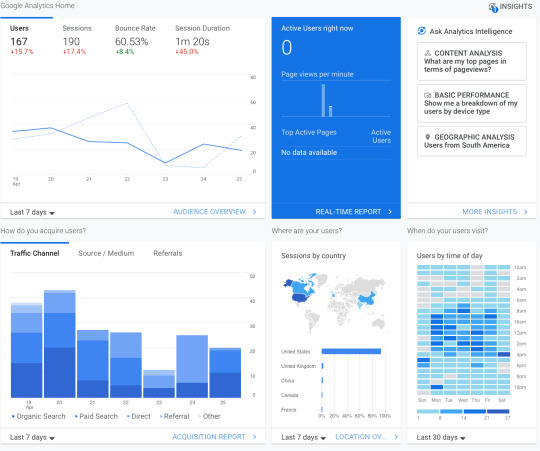
To track how well your website is performing, Google Analytics is an excellent tool. It measures real-time traffic and lets you set custom goals like purchases or signups. You can delve into revenue, return on investment (ROI) and return on ad spend (ROAS). When you link it to Google Ads, you can track ad performance and use their advanced machine learning capabilities to optimize advertising campaigns, based on cost per acquisition (CPA), ROI, or ROAS. With this information, you’ll learn which channels are performing best, see where your customers are coming from (devices and geographically), and use this information to optimize your site. Not bad for a free tool!
Related: 6 Metrics Your Boss Actually Cares About
SOCIAL MEDIA MANAGEMENT: BUFFER
Who has the time to continually post on social media? You do, now that you have a free tool that does it for you! With Buffer, you can schedule your social media posts across social sites in advance, so they’re set.
Their free option gives you up to three channels and their profiles, with ten social posts per queue (and no monthly or yearly limit), basic publishing tools, and a landing page builder for you to send leads to. They even shorten links automatically to save you characters. Buffer is a great way to manage the posts you’ve been meaning to post but haven’t gotten around to yet. It’s your social media assistant, automated.
If you like working with Buffer (and you will), you can opt for their next available plan, which lets you look at analytics, use their engagement tools, build a shopping landing page, and integrate with other apps:

These free marketing tools are all so helpful, and their paid versions often include even more helpful capabilities. We recommend trying them for free and if you find they’re really working for you, they may be worth an additional investment since they’re providing a strong return. Check them out and let us know how you do!
And if you need help integrating any of these tools or would like more marketing muscle in your toolbox, reach out to our team. We’re suckers for time-saving tools, and we love to help make marketing easier, smarter, and of course, better.
#socialmediamanagement#marketingtips#graphicdesigntips#chatgpt#socialmediamarketing#socialmediamarketing101#captionsforinsta#graphicdesigndaily#instagramcaptions#aitools#midjourney#ai#artificialintelligence#graphicdesigncommunity#canva#graphicdesigns#captionideas#marketing#digitalmarketing#photoshoptutorials#socialmediatip
19 notes
·
View notes
Text
Salesforce Integration Cloud | Cloudy Coders
Cloudy Coders is proud to provide Salesforce Integration services to help take your business to the next level!
Integrate any system and unlock real-time data in the cloud. Get more value from all your systems and data together, from anywhere.
No matter where the data is stored, a new integration cloud will surface it in order to connect every system, client, and device in an entirely new way.
Einstein Analytics Developer Experience and third-party Quip Live Apps make apps smarter and more collaborative with just a few clicks.
Contact us now to take the most out of advantage to the Integration platform
#salesforce#business#technology#data#cloud#financialservices#finance#financecloud#salesforcefinancialservices#financeandeconomy#financeindustry#salesforceconsultant#salesforceimplementation#salesforceintegration
2 notes
·
View notes
Text
Top SAP and Salesforce Consulting Company | LMTEQ
LMTEQ is one of the top SAP consulting companies that specialises in salesforce cloud services, mapping and integration services, as well as service now platform. We offer a wide variety of services and consultancy to our valuable clients. Our highly experienced team of certified SAP consultants provide unparalleled expertise to help craft the appropriate technology strategy for your enterprise. We are your reliable partner in achieving more efficient business operations. We have a wide portfolio of specialised products and services in SAP namely SAP S/4HANA, SAP MDG, SAP CX, SAP support, SAP qualtrics, SAP analytics cloud, SAP CRM, SAP fiori and many more.
2 notes
·
View notes
Text
Top 10 Tools for Digital Transformation Success

Digital transformation specialist relies on various tools to improve efficiency, automate workflows, and enhance customer experiences. Here are the top 10 tools that drive digital transformation success:
1. Cloud Computing Platforms
Tools: AWS, Microsoft Azure, Google Cloud
Enable scalability, security, and remote accessibility.
Power data storage, machine learning, and enterprise applications.
2. Customer Relationship Management (CRM)
Tools: Salesforce, HubSpot, Microsoft Dynamics 365
Centralizes customer data for improved sales, marketing, and support.
Uses AI-driven insights to enhance customer engagement.
3. Enterprise Resource Planning (ERP)
Tools: SAP S/4HANA, Oracle NetSuite, Microsoft Dynamics 365 ERP
Integrates finance, HR, supply chain, and operations into a unified system.
Enhances decision-making with real-time analytics.
4. Robotic Process Automation (RPA)
Tools: UiPath, Automation Anywhere, Blue Prism
Automates repetitive tasks, reducing manual effort and errors.
Improves efficiency in finance, HR, and customer service processes.
5. Business Intelligence & Data Analytics
Tools: Power BI, Tableau, Google Looker
Visualizes business data for actionable insights.
Uses AI-powered analytics for predictive decision-making.
6. Cybersecurity & Compliance
Tools: Palo Alto Networks, Cisco Security, Okta
Protects digital assets from cyber threats and ensures compliance.
Implements multi-factor authentication (MFA) and zero-trust security models.
7. Collaboration & Productivity
Tools: Microsoft 365, Google Workspace, Slack, Zoom
Enhances remote work and real-time collaboration.
Integrates cloud storage, messaging, and video conferencing.
8. Artificial Intelligence & Machine Learning
Tools: IBM Watson, Google Vertex AI, OpenAI API
Automates decision-making, enhances customer service, and drives predictive analytics.
Personalizes customer experiences through AI-driven insights.
9. Low-Code/No-Code Development
Tools: Mendix, OutSystems, Microsoft Power Apps
Enables non-developers to create applications quickly.
Speeds up digital transformation by reducing dependency on IT teams.
10. Internet of Things (IoT) & Edge Computing
Tools: AWS IoT, Google Cloud IoT, PTC ThingWorx
Connects devices and sensors for real-time monitoring.
Optimizes supply chain, manufacturing, and smart infrastructure.
How This Relates to Operations Excellence
Since you are in Operations Excellence Management, tools like RPA, ERP, and Business Intelligence can significantly enhance process efficiency and automation in your field. Implementing these can help you drive cost reduction, productivity gains, and data-driven decision-making in operations.
Would you like recommendations on specific tools that fit your industry or current role?
0 notes
Text
Enterprise Software Development: The Ultimate Guide for Modern Businesses
Ever wondered how large organizations efficiently manage their operations, workflows, and customer interactions? The answer lies in Enterprise Software Development, the backbone of streamlined processes and effective decision-making. Let’s dive deep into this transformative domain and see how it powers businesses to scale and thrive.
What Is Enterprise Software?
Enterprise software refers to applications designed to address the specific needs of organizations, helping them operate smoothly across various functions like HR, finance, supply chain, and customer relationship management (CRM). Unlike regular consumer software, enterprise software focuses on scalability, reliability, and integration across diverse systems.
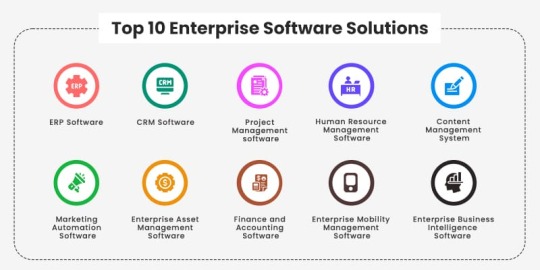
Some common enterprise software examples include:Software TypeEnterprise Software ExamplesPurposeEnterprise Resource Planning (ERP)SAP, Oracle ERPIntegrates business processes and data.Customer Relationship Management (CRM)Salesforce, Zoho CRMManages customer interactions and sales.Human Resource Management Systems (HRMS)Workday, BambooHRHandles HR tasks like payroll and hiring.Supply Chain Management (SCM)Kinaxis, LogilityOptimizes logistics and supply chain flows.
These tools fall under the umbrella of enterprise applications, offering tailored solutions for large-scale operations.
Why Enterprise Software Development Matters
The demand for enterprise software development arises from the unique challenges businesses face. Companies need systems that are robust, secure, and capable of handling vast amounts of data while ensuring seamless collaboration across departments.
Organizations often turn to enterprise software development services to build customized solutions. These services include designing, developing, and maintaining enterprise-grade software that aligns with an organization’s specific goals.
Key Features of Enterprise Software Applications
When we talk about enterprise software applications, their distinguishing features set them apart from standard software. Here are some of their key attributes:
1. Scalability
Designed to grow with the organization, enterprise software must accommodate increased users, data, and functionalities without a hitch.
2. Integration
These applications often integrate with other tools, ensuring a smooth flow of information across platforms like ERPs, CRMs, and analytics systems.
3. Customization
Off-the-shelf solutions may not always fit; hence customization becomes crucial to meet specific organizational needs.
4. Security
With sensitive data at stake, enterprise software prioritizes robust security measures to prevent breaches and ensure compliance.
5. Analytics and Reporting
Advanced reporting tools allow businesses to make data-driven decisions, fostering growth and efficiency.
Enterprise Software Development Services
Building enterprise-grade software is no small feat. It involves a mix of technology, strategy, and industry expertise. Here’s a closer look at some common enterprise software development services:
1. Custom Software Development
This involves designing and building software tailored specifically to an organization’s needs. Examples include internal communication platforms or a bespoke inventory management system.
2. Software Integration
This involves designing and building software tailored specifically to an organization’s needs. Examples include internal communication platforms or a bespoke inventory management system.
3. Cloud-Based Solutions
With cloud technology gaining traction, many businesses opt for enterprise applications hosted on platforms like AWS, Azure, or Google Cloud.
4. Mobile Enterprise Apps
Mobile-friendly applications ensure employees can access critical systems from anywhere, enhancing flexibility and productivity.
5. Maintenance and Upgrades
Regular updates and proactive maintenance are vital to keeping the software efficient, secure, and relevant in the fast-changing tech landscape.
Enterprise Software Development Best Practices
To create software that aligns with business objectives and delivers real value, adhering to enterprise software development best practices is essential.Why It MattersBest PracticeUnderstand User NeedsEnsures the software aligns with actual business requirements, avoiding costly misalignment.Adopt Agile MethodologiesEnables iterative development, fostering flexibility and collaboration throughout the project.Focus on SecurityProtects sensitive data and ensures compliance with industry regulations like GDPR or HIPAA.Plan for ScalabilityAllows the software to grow with the organization, avoiding costly redevelopments later.Thorough TestingPrevents bugs and ensures smooth performance in real-world scenarios.Choose the Right Technology StackImpacts software performance, maintainability, and compatibility with existing systems.
Enterprise Applications: Real-World Examples
To truly grasp the impact of enterprise applications, let’s look at some real-world scenarios:
Scenario 1: Managing Global Supply Chains
A multinational retail giant uses an ERP system like SAP to oversee inventory, logistics, and supplier relationships across continents. This centralized platform ensures that all departments work in sync, avoiding delays and bottlenecks.
Scenario 2: Enhancing Customer Relationships
A mid-sized IT firm leverages Salesforce, a CRM tool, to manage customer data, track sales pipelines, and personalize communication strategies. This approach leads to improved customer retention and higher sales conversions.
Scenario 3: Streamlining HR Processes
An enterprise with thousands of employees uses Workday, an HRMS, to automate payroll, manage benefits, and track performance evaluations, reducing administrative overhead.
Challenges in Enterprise Software Development
While the benefits are significant, enterprise software development comes with its share of challenges:
High Costs: Developing robust enterprise software requires substantial investment in technology and expertise.
Complexity: Integrating various systems and ensuring they work seamlessly together is no easy task.
Change Management: Employees may resist adopting new software, requiring thorough training and a clear change management strategy.
Data Security: Protecting sensitive business and customer data from cyber threats is an ongoing concern.
Future Trends in Enterprise Software Applications
As technology evolves, so do the possibilities for enterprise software applications. Here are some trends shaping the future:
1. Artificial Intelligence and Machine Learning
AI-driven analytics and predictive tools will empower businesses to make smarter, faster decisions.
2. Low-Code and No-Code Platforms
These platforms enable non-developers to create enterprise applications, democratizing the development process.
3. Blockchain for Security
These platforms enable non-developers to create enterprise applications, democratizing the development process.
4. Internet of Things (IoT) Integration
IoT-enabled enterprise software will provide real-time data from connected devices, enhancing operational efficiency.
Conclusion
Enterprise Software Development is the linchpin of modern business operations, enabling organizations to stay competitive, efficient, and customer-focused. From understanding what is enterprise software to exploring enterprise software development services and adopting enterprise software development best practices, businesses can unlock immense value and scalability.
As enterprises continue to embrace digital transformation, investing in robust enterprise applications is no longer optional—it’s essential. Whether you’re looking for tailored solutions, seamless integration, or future-ready tools, the right approach to enterprise software can redefine your organization’s success.
Ready to take the plunge? With the right strategy and technology, the possibilities are endless!
0 notes
Text
In today's dynamic business landscape, optimizing customer service is paramount. Our Salesforce Service Cloud implementation services empower organizations to streamline operations, enhance customer interactions, and drive growth. As a trusted Salesforce Service Cloud partner, we leverage our expertise to tailor solutions that align with your unique business needs. From initial consultation to deployment and ongoing support, we ensure a seamless transition to the cloud-based platform. Harness the power of Salesforce Service Cloud to deliver personalized service, automate processes, and gain actionable insights. Elevate your customer service experience with our comprehensive Salesforce implementation services.
#salesforce service cloud implementation partners#salesforce service cloud Implementation#salesforce service cloud analytics#salesforce certified service cloud consultant#salesforce service cloud consultant#salesforce cloud service provider#service cloud support#salesforce service cloud integration#salesforce service cloud features#salesforce service cloud services
0 notes
Text
Why Choosing a Salesforce Partner in India is the Key to Your Business Success
In today’s competitive business environment, customer relationship management (CRM) is a critical component for companies aiming to stay ahead. Salesforce is one of the most powerful and widely used CRM platforms, offering a comprehensive suite of tools for businesses to manage customer data, sales, marketing, and customer service. However, to fully harness the potential of Salesforce, partnering with a Salesforce Partner India can make all the difference in ensuring that your business maximizes the value of this platform.
The Role of a Salesforce Partner India A Salesforce Partner India is a certified expert or company that specializes in Salesforce solutions. These partners are skilled in helping businesses implement, customize, and optimize Salesforce to meet their specific needs. Whether you are a startup or an established business, a Salesforce Partner can provide tailored solutions that ensure Salesforce works seamlessly with your existing processes.
By collaborating with a Salesforce Partner India, you benefit from their in-depth knowledge and experience in managing Salesforce implementations. They help you navigate the complexities of the platform, from the initial setup to ongoing maintenance and support.
Why You Need a Salesforce Partner India Expertise in Salesforce Solutions: Salesforce is a feature-rich platform that offers various tools such as Sales Cloud, Service Cloud, Marketing Cloud, and more. A Salesforce Partner India has the expertise to customize these tools according to your unique business requirements. Whether you need help in automating sales workflows, building reports, or integrating third-party applications, a Salesforce Partner ensures that the platform meets your needs.
Efficient Implementation: Implementing Salesforce can be a complex task, especially for businesses that have not used a CRM system before. A Salesforce Partner India simplifies this process by handling all aspects of Salesforce setup. From data migration to system configuration, they ensure everything is done correctly, reducing the risk of costly errors and delays.
Cost-Effective Solutions: One of the biggest advantages of choosing a Salesforce Partner India is the cost-effectiveness of their services. India is known for offering high-quality Salesforce consulting at competitive prices. With a Salesforce Partner in India, you can access world-class CRM solutions without breaking your budget, making it an attractive option for businesses of all sizes.
Ongoing Support and Training: After implementing Salesforce, your team needs to know how to use it effectively. A Salesforce Partner India provides training sessions and ongoing support to ensure your team can fully utilize the platform. Whether it's troubleshooting issues or providing advice on how to improve your Salesforce system, the partner will be there to assist you every step of the way.
Customization and Scalability: As your business grows, your CRM needs will evolve. A Salesforce Partner India understands this and helps you scale Salesforce to accommodate new customers, products, or services. They can build custom applications, workflows, and integrations that adapt as your business expands.
How a Salesforce Partner India Benefits Your Business Working with a Salesforce Partner India provides several advantages that can significantly improve your business performance:
Increased Efficiency: By automating processes and integrating Salesforce with other tools, a Salesforce Partner India helps streamline your workflows, reducing manual tasks and increasing productivity.
Improved Customer Relationships: With Salesforce, you can manage customer interactions in a more organized and efficient manner. A Salesforce Partner India ensures the platform is tailored to enhance customer engagement, helping you build stronger relationships with your clients.
Better Decision Making: Salesforce’s powerful analytics and reporting tools help you make data-driven decisions. A Salesforce Partner can customize these tools to give you insights into your business performance, customer behavior, and market trends.
Conclusion Choosing a Salesforce Partner India for your CRM needs is a smart decision that can significantly enhance your business operations. Their expertise in Salesforce implementation, customization, and support ensures that your business makes the most of this powerful platform. By working with a Salesforce Partner in India, you can boost efficiency, improve customer relationships, and scale your business with ease. Whether you're new to Salesforce or looking to optimize your existing system, a Salesforce Partner India can provide the right solutions for your needs.

0 notes
Text
AI-Powered Transformation in Salesforce Financial Service Cloud and CRM Analytics
Introduction The rise of artificial intelligence (AI) is reshaping industries globally, and Salesforce has embraced this change with open arms. By integrating AI into its platform, Salesforce is enhancing customer relationship management (CRM) and analytics, offering businesses more precise insights and automation. The Salesforce Financial Service Cloud, specifically designed for the financial sector, leverages these tools to improve decision-making, customer service, and overall business performance.
AI Integration in Salesforce Salesforce and AI-powered features, like Salesforce Einstein, have brought significant improvements to its CRM platform. By embedding AI into Salesforce solutions, companies can predict trends, automate workflows, and provide more personalized experiences to their customers. For financial institutions, this means being able to anticipate customer needs, streamline operations, and make more informed financial decisions.
AI enhances CRM analytics by offering predictive insights that traditional tools could not provide. For instance, AI can analyze vast datasets, identifying patterns that help businesses predict customer behavior. This allows companies to tailor their services, improving customer satisfaction and retention. With AI at the helm, Salesforce users can optimize marketing campaigns, sales forecasts, and customer interactions.
CRM Analytics for Better Insights CRM analytics has long been a key feature of Salesforce, providing businesses with tools to track and analyze customer interactions. The introduction of AI has elevated CRM analytics by delivering real-time, actionable insights. Companies can now track key metrics, identify emerging trends, and make data-driven decisions that improve business performance.
For financial institutions, these analytics are essential. With Salesforce Financial Service Cloud, banks and financial advisors can monitor customer portfolios, analyze risk factors, and develop personalized financial strategies. The platform’s AI-driven insights allow them to make more accurate predictions about customer needs, ensuring that their services are always relevant and timely.
Salesforce Financial Service Cloud in Action The Salesforce Financial Service Cloud is designed to address the unique needs of the financial industry. It offers comprehensive tools for managing client relationships, automating processes, and providing personalized service. The addition of AI capabilities further enhances the platform, enabling institutions to operate more efficiently.
With AI, financial advisors can automate routine tasks such as client onboarding and reporting. This allows them to focus more on building relationships with clients. CRM analytics further helps by providing real-time data on client portfolios, market trends, and financial performance, enabling advisors to make informed decisions quickly.
The Salesforce Financial Service Cloud’s AI-powered features also help institutions meet regulatory requirements by automating compliance processes. This ensures that financial firms stay ahead of the curve in an increasingly complex regulatory environment.
Conclusion Salesforce, through its AI-driven CRM analytics and Financial Service Cloud, is revolutionizing how financial institutions operate. The integration of AI allows businesses to unlock deeper insights, automate routine tasks, and deliver more personalized customer experiences. As AI technology continues to advance, its role in Salesforce will only become more integral, further transforming the way businesses interact with their customers and manage financial services.
0 notes
Text
Healthcare CRM Market Economic Policies and Market Expansion Potential
The global Healthcare Customer Relationship Management (CRM) market is experiencing substantial expansion, driven by the increasing need for healthcare organizations to enhance patient engagement, streamline operations, and deliver personalized care. Valued at USD 16.84 billion in 2023, the market is projected to reach USD 37.09 billion by 2032, growing at a Compound Annual Growth Rate (CAGR) of 9.19% over the forecast period from 2024 to 2032.
Get Free Sample Report @ https://www.snsinsider.com/sample-request/2088
Regional Analysis
North America: Dominating the market with a 58.0% share in 2023, North America's leadership is attributed to its advanced healthcare infrastructure and supportive government initiatives.
Europe: Holding the second-largest revenue share, Europe's market growth is propelled by significant development and a strong presence of healthcare providers and institutions, fueling demand for healthcare CRM solutions.
Asia-Pacific: This region is anticipated to witness the fastest growth, driven by the digital transformation of healthcare systems and increasing investments in healthcare IT infrastructure.
Market Segmentation
The Healthcare CRM market is segmented based on component, functionality, deployment mode, and end-use:
By Component: Software and Services.
By Functionality: Customer Service and Support, Digital Commerce, Marketing, Sales, and Cross-CRM.
By Deployment Mode: On-premise and Cloud/Web-based Models.
By End-Use: Healthcare Providers, Healthcare Payers, and others.
Key Healthcare CRM Comapnies
Microsoft (Redmond, Washington, USA)
Oracle (Cerner Corporation) (Austin, Texas, USA)
IBM (Armonk, New York, USA)
SAP (Walldorf, Germany)
Accenture (Dublin, Ireland)
Zoho Corporation (Chennai, India)
hc1 (Indianapolis, Indiana, USA)
LeadSquared (Bengaluru, India)
Salesforce (San Francisco, California, USA)
Veeva Systems (Pleasanton, California, USA)
Talisma (Bengaluru, India)
Alvaria (Westford, Massachusetts, USA)
NICE (Ra’anana, Israel)
Verint Systems Inc. (Melville, New York, USA)
Creatio (Boston, Massachusetts, USA)
Cured (Acquired by Innovaccer Inc.) (San Francisco, California, USA)
Actium Health (Palo Alto, California, USA)
Keona Health (Chapel Hill, North Carolina, USA)
MediCRM.ai (Denver, Colorado, USA)
Key Highlights
The Healthcare CRM market was valued at USD 16.84 billion in 2023.
Projected to reach USD 37.09 billion by 2032.
Expected CAGR of 9.19% from 2024 to 2032.
North America held a 58.0% market share in 2023.
Asia-Pacific region anticipated to exhibit the fastest growth.
Future Outlook
The future of the Healthcare CRM market appears promising, with technological advancements such as Artificial Intelligence (AI) and Machine Learning (ML) expected to further enhance CRM capabilities. These technologies will enable predictive analytics, offering deeper insights into patient behaviors and preferences, thereby facilitating more proactive and personalized care. Additionally, the increasing adoption of telehealth services and remote patient monitoring systems is likely to integrate seamlessly with CRM platforms, providing a holistic view of patient interactions and health data.
Conclusion
The Healthcare CRM market is on a robust growth trajectory, driven by the global shift towards patient-centered care and the digitalization of healthcare services. As healthcare organizations continue to prioritize patient engagement and operational efficiency, the adoption of CRM systems is poised to become increasingly integral to achieving these objectives.
Contact Us: Jagney Dave - Vice President of Client Engagement Phone: +1-315 636 4242 (US) | +44- 20 3290 5010 (UK)
Other Related Reports:
Urgent Care Apps Market
Healthcare Chatbots Market
Artificial Intelligence in Healthcare Market
#Healthcare CRM Market#Healthcare CRM Market Trends#Healthcare CRM Market Size#Healthcare CRM Market Share
0 notes
Text
Ms Power Apps - Enterlogix Corporation
Enterlogix Corporation leverages Microsoft Power Apps to empower businesses with custom applications and digital solutions. Our team utilizes the power of Power Apps to design and develop user-friendly, scalable, and efficient applications tailored to meet unique business requirements. For more information, visit our website or contact us.
+1 832-278-1229
#data rescue service#Salesforce Service Cloud Consultant#Cloud Strategy Consulting#Business Intelligence Services#Business Intelligence Analytics#Risk Analysis Service#Risk Management Strategy#Microsoft CRM System#Ms Power Apps#Power Platform Microsoft#Barcode Scanners Apps#Barcode Reader App
0 notes